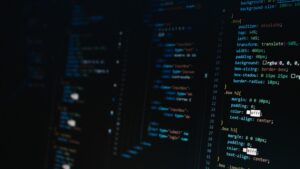In today’s digital age, programming is not just a skill reserved for computer scientists; it’s a critical tool in a vast array of industries. Understanding the fundamentals of programming can unlock opportunities and enhance problem-solving capabilities. Whether you’re a beginner looking to dip your toes into the world of coding or a professional seeking to bolster your skill set, mastering the basics is your first step toward fluency.
Programming Foundations: Fundamentals
 Programming foundations encompass the basic concepts and skills required to understand and write computer programs effectively. At its core, this involves a grasp of various elements such as variables, which store values for computational use; data types, which categorize the kinds of data a program can handle; control structures, which dictate the flow of execution within a code; and algorithms, which are step-by-step procedures or formulas for solving problems. These components are crucial as they provide the building blocks for more complex software development.
Programming foundations encompass the basic concepts and skills required to understand and write computer programs effectively. At its core, this involves a grasp of various elements such as variables, which store values for computational use; data types, which categorize the kinds of data a program can handle; control structures, which dictate the flow of execution within a code; and algorithms, which are step-by-step procedures or formulas for solving problems. These components are crucial as they provide the building blocks for more complex software development.
Mastering the fundamentals of programming enhances a programmer’s ability to solve problems efficiently and adapt to different programming environments. A solid understanding of the basics allows developers to read, modify, and write code that is both effective and efficient. Furthermore, foundational skills serve as the cornerstone for learning more advanced programming languages and technologies. Programmers who excel in these fundamental skills often find it easier to understand the underlying mechanics of new tools and frameworks, enabling them to tackle more complex projects with confidence.
Key Concepts in Programming Foundations
Variables and Data Types
 Variables are the basic units of storage in programming. They hold the values that a program may need to manipulate. Each variable is associated with a data type that dictates the kind of value it can hold, such as integers, doubles, strings, or booleans. Data types are critical because they help to ensure accuracy in the handling of data within a program. For example, integers allow the program to handle whole numbers, while strings manage sequences of characters. Understanding variables and data types makes it easier to grasp other programming concepts, as they’re the foundation for most operations within codes.
Variables are the basic units of storage in programming. They hold the values that a program may need to manipulate. Each variable is associated with a data type that dictates the kind of value it can hold, such as integers, doubles, strings, or booleans. Data types are critical because they help to ensure accuracy in the handling of data within a program. For example, integers allow the program to handle whole numbers, while strings manage sequences of characters. Understanding variables and data types makes it easier to grasp other programming concepts, as they’re the foundation for most operations within codes.
Control structures dictate the flow of execution within a program. Common control structures include if statements, switch cases, and loops such as for, while, and do-while loops. These elements allow a program to make decisions (if statements, switch cases) or perform repetitive tasks (loops). For instance, a for loop runs a section of code a specific number of times, enhancing tasks like iterating over arrays or automatic repetitive testing. Mastery of control structures and loops enhances a programmer’s ability to design programs that are both efficient and easy to maintain, paving the way for more complex problem-solving and algorithm development.
Recommended Books and Online Courses
 For those who prefer a structured learning path, books and online courses serve as invaluable resources. One must not miss “Programming Basics for Absolute Beginners” by Michael Clark, which offers a clear introduction to essential programming concepts. Additionally, “Head First Programming” by Paul Barry and David Griffiths uses a visually rich format to make learning programming more engaging.
For those who prefer a structured learning path, books and online courses serve as invaluable resources. One must not miss “Programming Basics for Absolute Beginners” by Michael Clark, which offers a clear introduction to essential programming concepts. Additionally, “Head First Programming” by Paul Barry and David Griffiths uses a visually rich format to make learning programming more engaging.
Online courses complement books effectively, providing interactive content and real-time feedback. Websites like Coursera and Udemy feature courses such as “Python for Everybody” and “Java Programming Basics,” which are perfect for beginners. These courses often include video tutorials, quizzes, and coding exercises, offering a comprehensive learning experience.
Interactive Learning Platforms
Interactive learning platforms introduce a dynamic aspect to programming education, perfect for those who learn best through doing. Platforms like Codecademy and freeCodeCamp offer hands-on programming exercises which help in reinforcing the concepts covered in books and courses. They provide environments where learners can write code and see the outcomes immediately, helping to solidify their understanding of the topics discussed.
Both platforms cover a range of languages and topics, from basic HTML and CSS to more advanced languages like JavaScript and Python. By engaging with these platforms, beginners can build projects and gain practical experience, which is crucial for understanding real-world applications of programming concepts.

